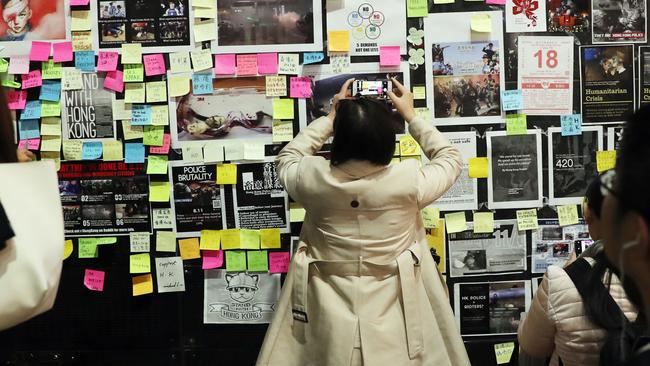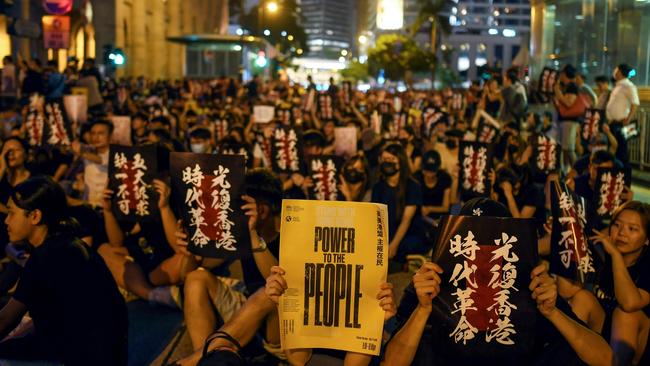Australia’s future rests in the Hong Kong protests
It’s true that China trades with Australia because it’s in their interest to do so, but it’s time we begin to consider just how prepared are we as a nation if that changed, writes Peta Credlin.
Rendezview
Don't miss out on the headlines from Rendezview. Followed categories will be added to My News.
Australia, we need to talk.
About China. About the economic opportunity that has turned into a strategic challenge. About the cuddly panda with sharp teeth and claws. About the one-time gold mine that is now an ominous risk to peace in our region.
China is our biggest trading partner by far. It is our largest source of foreign students. More than half a million Australians were born in China and more than a million of us have Chinese ancestry.
Of course, life would be so much simpler if China were like Britain, the only other country to have bulked as large in our trade and to have had more of its people become our citizens. But as events in Hong Kong are showing, China is utterly unlike the powers that have dominated our region for almost the entire time modern Australia has existed.
RELATED: Hundreds swarm Martin Place to protest Hong Kong unrest
The People’s Armed Police, China’s paramilitary police force massing just across the border, poised to crush the protests in Hong Kong, are a sign of what happens when Beijing is crossed.
The people of Hong Kong aren’t asking for much. They just want China to honour the 1997 “one country, two systems” agreement and to respect the freedom and autonomy it purported to guarantee, without fear of a legally sanctioned one-way ticket to a Chinese jail for anyone Beijing dislikes.

That so many young people in Hong Kong yearn for the freedom and justice that only their parents truly knew is indeed inspiring, as John Howard has said. But it’s placed them on a collision course with an insecure dictatorship that can only end badly, at least in the short term.
The Tiananmen-style crackdown that’s surely coming, if the protests persist, will destroy Hong Kong as a great global city and ruin Australia’s $11 billion two-way trade with Hong Kong. In human terms, it will convulse the 100,000 Hong Kong-born people living here and send the 100,000 Australian expatriates living in the administrative region, scurrying home.
More widely, it will turbocharge, with a potent human rights dimension, the escalating US-China conflict over trade and security. It will send powerful economic tremors throughout East Asia. It will force every significant country in our region to take sides. And it will remind everyone that there are really only two options in dealing with China: submission; or such strength that you can’t be taken advantage of.
RELATED: Australia upgrades Hong Kong travel advice as China delivers chilling warning to protesters
The likely crackdown in Hong Kong and the abrogation, in fact if not in theory, of the one country, two systems deal, will immediately ratchet up the pressure on Taiwan: the practically independent province of 24 million people (with its own armed forces and an American security guarantee) that China desperately wants to take back.

It would pose a real prospect of war between superpowers. The alternative would be a massive regional arms race as every country that chooses not to accept Chinese overlordship tries to make itself impregnable.
Suddenly, Australia’s world looks much more perilous than it did only a few years ago when the main challenge we thought we faced was Islamist extremism. And this is a problem that’s much easier to identify and to analyse than it is to actually to deal with.
RELATED: Protests return to Hong Kong airport
China’s influence buying in the Pacific is bad enough. We will find it hard to avoid a massive soft-loan to PNG, in order to avoid a Chinese bailout of our near-bankrupt neighbour that eventually leads to a foreign naval base at Port Moresby. China cares nothing for domestic CO2 emissions but that won’t stop it playing the politics of climate change against us in our backyard. Look at last week’s Pacific Island’s Forum for evidence that the new brinkmanship for our neighbours is “pay us more aid, call it climate money, or we’ll go with China”; and this is despite the $1.5 billion a year Australian taxpayers already provide locally, and knowing all too well that we can’t allow China a serious foothold in our region.
It’s true that China trades with us because it’s in China’s interests to do so, not in ours. But how prepared are we, and our companies, our universities and our tourism sector, indeed our wider economy, if that changed?
These are just some of the excruciating choices we would face if the wrong red lines are crossed in the next few weeks.
Originally published as Australia’s future rests in the Hong Kong protests



